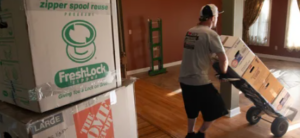Former Topekans Craig and Linda Wright got their possessions back Tuesday, after a moving company kept them for 28 days.
But not everyone is so fortunate. Some companies never return their clients’ possessions or hold them hostage while demanding more money.
Representatives from a longtime Topeka moving company and the Federal Motor Carrier Safety Administration talked this week with The Capital-Journal about how to search for the right movers.
Craig and Linda Wright thought Miami-based JM Moving Co. was worthy of their trust last month when they hired it to move almost all their possessions from Topeka to Ocean Springs, Miss., their new home.
“We asked him all the pertinent questions … bonded, insured, costs, signed what appeared to be a valid contract, he had a USDOT number, etc.,” Linda Wright wrote on Facebook. “It just all seemed on the up and up.”
But for weeks, she said, all she got during cell phone conversations was excuses as to why their possessions hadn’t arrived. 
It wasn’t until Tuesday, a day after an article about their plight was published on the websites of The Capital-Journal and USA Today, that the company returned their possessions in Ocean Springs, Linda Wright said.
Until then, the Wrights feared they had been victims of a scam.
In one common scenario, the Better Business Bureau’s website says: “The movers provide an estimate, arrive on time and load your belongings on a truck. However, this is where the interaction turns disastrous. When the truck fails to arrive at its destination, either your belongings are simply gone or the company requires the consumer to pay an additional fee to have them delivered, holding the possessions hostage.”
People who are moving can find a great deal of helpful information for free at www.protectyourmove.gov, on the website of the Federal Motor Carrier Safety Administration, an FMCSA spokesperson told The Capital-Journal on Tuesday.
The FMCSA encourages potential moving company clients to make sure that anyone they’re thinking of hiring is registered with the federal government by checking a searchable database of movers, which is available on that website. A federal DOT number is provided to registered movers.
Troy Love, the owner for the past 12 years of Topeka-based Love’s Moving Service LLC, encourages those hiring movers in Kansas to make sure the company is registered with the Kansas Corporation Commission as well.
Love’s Moving Service is among 79 companies listed as being registered on the KCC website. The company was previously owned by Love’s father and has been in business here for more than 30 years.
Love urged moving company customers to make sure any company they hire carries adequate insurance and has a specific business office location out of which it works.
He also suggests potential moving company clients go online and check reviews of anyone they’re considering hiring, although the BBB warns that companies sometimes post bogus positive reviews.
The FMCSA suggests potential moving company clients obtain estimates from at least three movers and/or brokers, and compare costs and the services they provide.
The Better Business Bureau recommends that people who are moving create and maintain an inventory of their belongings.
If a mover asks for a large down payment or full payment in advance, that might be an indication of a fraudulent business, its website says.
A mover or broker might also be dishonest if they give a low estimate online or over the telephone without ever having seen the potential customer’s home and possessions, the FMCSA says.
“Before moving your household goods interstate, movers are required to give you the ‘Your Rights and Responsibilities When You Move’ booklet and FMCSA’s ‘Ready to Move’ brochure to help you understand the documents that a mover will ask you to sign, and explains your rights if your household goods are lost or damaged,” its website says.
The FMCSA also recommends the following:
- Checking with the Better Business Bureau regarding the history of the mover and/or broker.
- Finding out what the mover’s responsibilities are for damages that may occur to your belongings.
- Ask if the mover and/or broker have a dispute settlement program.
- Finding out how and when pickup and delivery of the household goods involved will occur.
- Finding out from the mover and/or broker how they can be contacted before the move, during the move, and after the move.
Those who are moving might also want to leave AirTags, which provide GPS tracking, with their possessions to help track their whereabouts.
An article published last January in Newsweek told of how the wife in a military family moving from Colorado to New York placed an Apple AirTag in a box of her son’s toys.
Later, when a mover allegedly lied to the couple about his whereabouts and said the last of their possessions would arrive in a day or two, they told him they knew those possessions were less than five hours away, Newsweek reported.
It quoted the wife as saying she thought her family would have had to wait much longer if the AirTag hadn’t been present.
As reported in the Topeka Capital Journal



